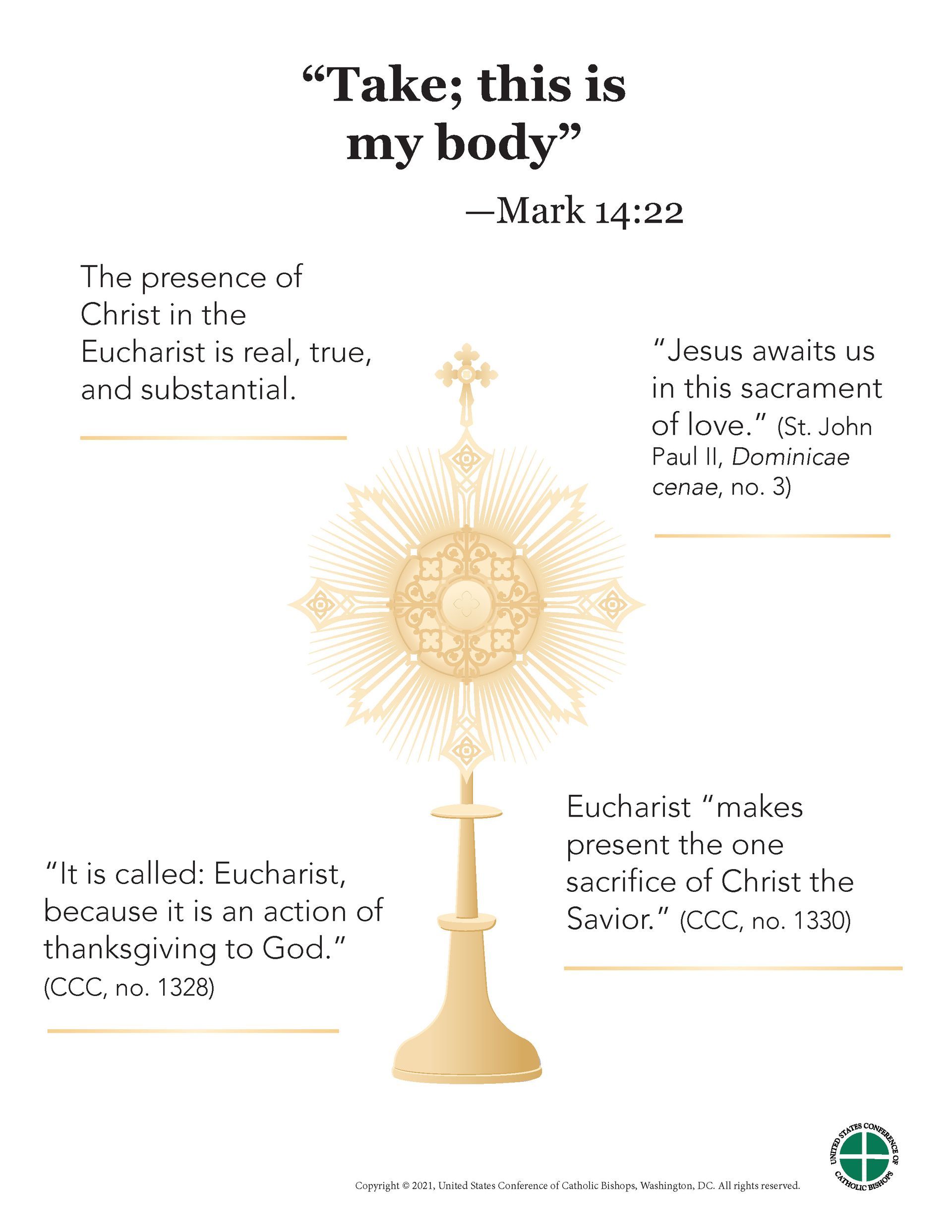Eucharist
What is the Eucharist?
What is the Eucharist?
The Eucharist is the source and summit of the Christian life.
The term “Eucharist” originates from the Greek word eucharistia, meaning thanksgiving.
Where is the Eucharist mentioned in the Bible?
The Lord Jesus, on the night before he suffered on the cross, shared one last meal with his disciples. During this meal our Savior instituted the sacrament of his Body and Blood. He did this in order to perpetuate the sacrifice of the Cross throughout the ages and to entrust to the Church a memorial of his death and resurrection. The Institution of the Eucharist is written down in the four Gospels below:
- Matthew 26:26-30
- Mark 14:22-26
- Luke 22:14-20
- John 6:22-59 (The Bread of Life Discourse)
Why does Jesus give himself to us as food and drink?
Jesus gives himself to us in the Eucharist as spiritual nourishment because he loves us. By eating the Body and drinking the Blood of Christ in the Eucharist, we become united to the person of Christ through his humanity. "Whoever eats my flesh and drinks my blood remains in me and I in him" (Jn 6:56).
In being united to the humanity of Christ, we are at the same time united to his divinity. Our mortal and corruptible natures are transformed by being joined to the source of life.
Is the Eucharist a symbol?
The transformed bread and wine are truly the Body and Blood of Christ and are not merely symbols. When Christ said “This is my body” and “This is my blood,” the bread and wine are transubstantiated. Though the bread and wine appear the same to our human faculties, they are actually the real body and blood of Jesus.
The Liturgy of the Eucharist
The Liturgy of the Eucharist begins with the preparation of the gifts and the altar. As the ministers prepare the altar, representatives of the people bring forward the bread and wine that will become the Body and Blood of Christ. The celebrant blesses and praises God for these gifts and places them on the altar, the place of the Eucharistic sacrifice. In addition to the bread and wine, monetary gifts for the support of the Church and the care of the poor may be brought forward. The Prayer over the Offerings concludes this preparation and disposes all for the Eucharistic Prayer.
Does the bread cease to be bread and the wine cease to be wine?
Yes. In order for the whole Christ to be present—body, blood, soul, and divinity—the bread and wine cannot remain, but must give way so that his glorified Body and Blood may be present. Thus in the Eucharist the bread ceases to be bread in substance, and becomes the Body of Christ, while the wine ceases to be wine in substance, and becomes the Blood of Christ. As St. Thomas Aquinas observed, Christ is not quoted as saying, " This bread is my body," but " This is my body" ( Summa Theologiae, III q. 78, a. 5).
Holy Communion vs Eucharist FAQ
The word "Eucharist" refers to the Sacrament of the Eucharist, which is the Body and Blood of Jesus Christ truly present on the altar under the appearances of bread and wine. The word "communion" refers the actual reception of the Eucharist by the person receiving it, as well as the communion of the members of the Church.


